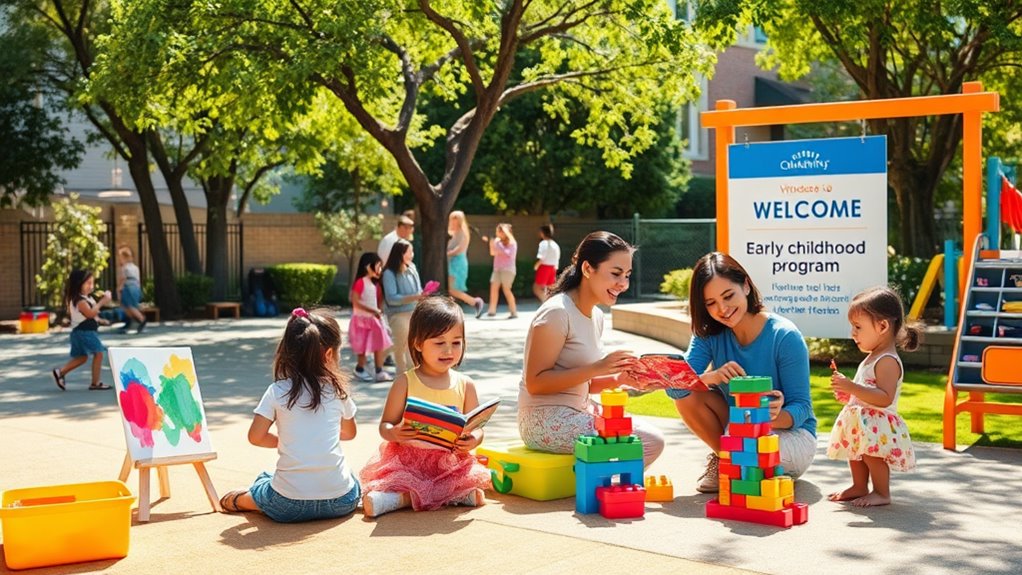Secret to Your Child’s Success – How Parent-Teacher Communication Changes Everything!
The secret to your child’s success lies in effective parent-teacher communication. When you regularly connect with teachers, you create a supportive learning environment that enhances your child’s academic journey. This open dialogue helps you understand your child’s progress and challenges, allowing for timely interventions. By attending school events and fostering trust, you strengthen the partnership, boosting your child’s motivation and accountability. Your involvement not only reinforces learning at home but also develops vital social skills. Want to discover practical strategies to maximize this communication? There’s much more to explore!
Importance of Parent-Teacher Communication
Recognizing the vital role that communication plays in a child’s education, effective parent-teacher communication fosters a supportive learning environment. When you engage with your child’s teacher, you’re not just sharing information; you’re building a partnership that directly impacts your child’s academic success. Open lines of communication allow you to address any concerns, celebrate achievements, and stay informed about classroom activities.
Regular updates from teachers keep you in the loop regarding your child’s progress and challenges. You can provide valuable insights about your child’s strengths and interests, enabling teachers to tailor their approach. When you and the teacher collaborate, it creates a consistent message for your child, reinforcing the importance of education and encouraging them to strive for excellence.
Moreover, effective communication builds a sense of community. You contribute to a school culture where parents and teachers work together to support children’s learning. This partnership not only benefits your child academically but also enhances their social and emotional development. Ultimately, when you prioritize communication with your child’s teacher, you’re setting the stage for a successful educational experience and empowering your child to reach their full potential.
Building Trust and Rapport
Building trust and rapport between parents and teachers is essential for creating a strong educational foundation for your child. When you foster open communication with your child’s teacher, you establish a partnership that benefits everyone involved. You should feel comfortable sharing your concerns, insights, and expectations, while also being receptive to the teacher’s perspective and expertise.
To build this trust, consider initiating regular conversations. Ask about your child’s progress and share any relevant information that could help the teacher support your child better. Consistent communication signals your commitment to your child’s education and shows that you value the teacher’s role.
Also, attend school events and parent-teacher meetings. These gatherings offer opportunities to connect personally and help you understand the school environment. When you approach these interactions with an open mind and a positive attitude, you create an atmosphere of mutual respect.
Finally, remember that trust takes time. Be patient and consistent in your efforts to build rapport. By actively engaging with your child’s teacher, you’re not only supporting your child but also contributing to a collaborative educational community that can lead to lasting success.
Enhancing Student Achievement
Effective parent-teacher communication plays a vital role in enhancing student achievement. When you engage with your child’s teacher, you gain insights into their strengths and areas needing improvement. This understanding allows you to support your child more effectively at home. If a teacher notices your child struggling with a specific subject, you can reinforce learning through targeted activities or discussions.
Additionally, consistent communication fosters a collaborative environment. By sharing information about your child’s interests and challenges, you and the teacher can create tailored strategies that motivate and engage your child. This teamwork can lead to improved academic performance and a greater sense of belonging in the classroom.
Moreover, when you demonstrate an active interest in your child’s education, it sends a powerful message. Your child sees that you value their learning, which can boost their motivation and self-esteem. It also encourages them to communicate with you about their school experiences, creating a feedback loop that further supports their academic growth.
Ultimately, when you work hand-in-hand with teachers, you’re not just enhancing your child’s academic success; you’re also helping them develop essential life skills like communication, collaboration, and resilience.
Practical Communication Strategies
While it’s essential to understand the importance of communication between parents and teachers, implementing practical strategies can make a significant difference. By fostering a strong partnership, you can support your child’s educational journey effectively. Here are three practical communication strategies to consider:
-
Regular Check-ins: Schedule brief meetings or phone calls with your child’s teacher throughout the school year. This keeps you informed about their progress and any areas needing attention.
-
Use Technology: Leverage tools like school apps, emails, or messaging platforms to maintain ongoing communication. These platforms often provide updates on assignments, grades, and important announcements, making it easier to stay engaged.
-
Attend School Events: Participate in parent-teacher conferences, open houses, and school activities. These events give you the chance to connect with educators and other parents while demonstrating your commitment to your child’s education.
Creating a Supportive Learning Environment
A supportive learning environment is crucial for your child’s academic success and overall well-being. To create this environment, start by establishing a routine that includes dedicated time for homework and study. Consistency helps your child feel secure and focused. Make sure the study area is quiet, organized, and free from distractions, allowing them to concentrate better.
Show your child that learning is important by being engaged in their education. Ask about their day, listen to their concerns, and celebrate their achievements, no matter how small. This involvement fosters a sense of belonging and demonstrates that you value their efforts.
Encourage your child to ask questions and express their thoughts. This open communication builds confidence and critical thinking skills. Additionally, collaborate with their teacher to understand their strengths and areas for improvement. Teachers can provide valuable insights that help you further support your child at home.
Finally, model a positive attitude towards learning. Share your own learning experiences and challenges, emphasizing that it’s okay to make mistakes. By fostering curiosity and resilience, you create an environment where your child can thrive academically and emotionally.
Overcoming Communication Barriers
Building strong relationships with teachers is key to supporting your child’s education, but communication can sometimes hit roadblocks. To ensure effective dialogue, you can take proactive steps to overcome these barriers.
-
Establish Clear Expectations****: Early in the school year, clarify how you and the teacher prefer to communicate. Whether it’s through emails, phone calls, or face-to-face meetings, setting these expectations helps avoid misunderstandings.
-
Be Open and Honest*: *Share your thoughts and concerns openly. If you’re struggling to connect or if there are issues at home affecting your child’s performance, letting the teacher know can foster a supportive environment. Transparency encourages collaboration.
-
Utilize Technology: Many schools offer platforms for communication between parents and teachers. Familiarize yourself with these tools, whether it’s a school app or an online portal. They can streamline information sharing, making it easier to stay updated on your child’s progress.
Long-term Benefits for Students
Strong parent-teacher communication can lead to significant long-term benefits for students. When you actively engage with your child’s teachers, you create a support system that fosters academic success and emotional well-being. This collaboration helps you stay informed about your child’s progress, allowing you to address issues before they escalate.
One major benefit is improved academic performance. Students whose parents regularly communicate with teachers often show higher grades and increased motivation. You’ll also notice that your child develops a stronger sense of accountability and responsibility for their learning.
Additionally, effective communication contributes to better social skills. When you and the teacher work together, you model healthy communication practices for your child. This sets the stage for them to build positive relationships with peers and adults alike.
Another long-term benefit is resilience. By fostering a partnership with the school, you help your child learn how to navigate challenges, seek help when needed, and develop problem-solving skills. In the end, strong parent-teacher communication lays a foundation for your child’s future success, equipping them with the tools they need to thrive both academically and personally.
Frequently Asked Questions
How Can I Approach a Teacher About My Child’s Struggles?
To approach your child’s teacher about struggles, schedule a meeting, express your concerns clearly, and ask for insights. Collaborate on strategies to support your child, and maintain open communication for ongoing progress.
What Tools Can Help Facilitate Parent-Teacher Communication?
To facilitate parent-teacher communication, you can use tools like email, messaging apps, school portals, or scheduled meetings. These platforms help you stay updated on your child’s progress and address any concerns effectively.
How Often Should I Communicate With My Child’s Teacher?
You should communicate with your child’s teacher regularly, ideally once a month. This keeps you informed about their progress and any concerns, fostering a collaborative environment that supports your child’s learning and development effectively.
What Should I Do if Communication Feels One-Sided?
If communication feels one-sided, reach out directly. Ask specific questions about your child’s progress. Suggest regular check-ins or share your insights. Building rapport encourages the teacher to engage more, fostering a better partnership for your child’s growth.
How Can I Encourage My Child to Share School Experiences?
To encourage your child to share school experiences, ask open-ended questions about their day, show genuine interest, and create a comfortable environment. Celebrate their stories, and they’ll feel more inclined to share with you.





